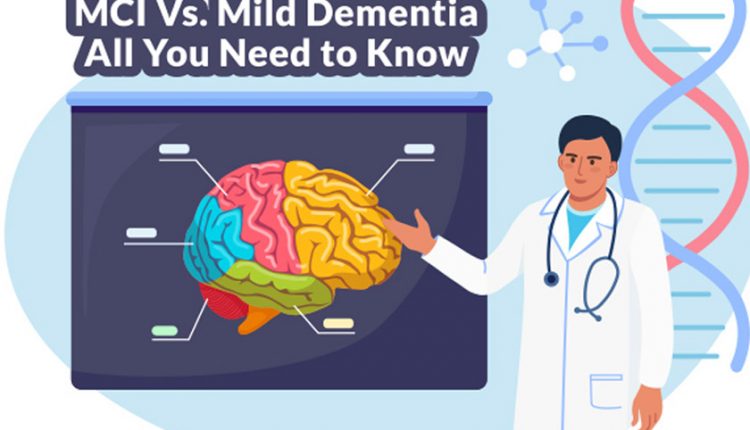
What Are the Differences Between MCI & Mild Dementia
Mild cognitive impairment and mild Dementia are common mental problems in seniors. Mild Cognitive Impairment (MCI) refers to a decline in brain function. The condition can also appear as an early stage of Dementia.
In contrast to Mild Cognitive Impairment (MCI), people with Dementia experience more severe cognitive performance symptoms. Changes in cognitive abilities may affect a person’s memory, language, thinking, behaviour, problem-solving and multitasking skills. In MCI, the severity of these symptoms does not significantly impact one’s ability to function on a daily basis. Dementia patients, on the other hand, will display more noticeable symptoms and have trouble completing everyday tasks.
In this article, we will focus on the difference between MCI and Mild Dementia. Keep reading to see how these two differ.
Contents
What Are the Cognitive Functions of the Brain?
As we age, we become more prone to forgetting, which is an intrinsic part of our nature. Sometimes you may forget a name or an appointment, which is part of the natural process. Nevertheless, when such events become frequent, suspicion should be raised that there is more going on than just normal forgetfulness. In addition, re-asking questions frequently is a sign of significant memory loss.
There are five categories of cognitive functioning:
- Learning and memory
- Language
- Visuospatial
- Executive
- Psychomotor
There is a reasonable correlation between these categories and where they reside in the brain. It is only necessary to have problems in one of these categories to diagnose MCI, whereas more than one category must be impaired to diagnose Dementia.
What Is Mild Cognitive Impairment?
Mild cognitive impairment (MCI) is a term used to describe adults experiencing normal aging. Their cognitive function is impaired and shows a decline from their previous levels. Still, in their daily lives, they can function independently or nearly in a manner not unlike what they once did. Although most MCI publications focus on the earliest signs of Alzheimer’s disease (AD), MCI is a syndrome that can have many causes:
- Side effects from medication
- Sleep disorders like sleep apnea
- Early stages of Alzheimer’s disease or another type of Dementia.
- Depression, stress, and anxiety
- Vitamin deficiencies
- Thyroid disorders
- Autoimmune conditions
- Infections
What Are the Symptoms of MCI?
It is essential for primary care providers to be familiar with the diagnosis, prognosis, and treatment of MCI patients. In order to rule out other causes of memory loss, such as depression, stress, medication problems, or nutritional deficiencies, a physical examination and blood tests may be necessary.
For example, MCI is characterized and diagnosed by the following symptoms:
- Repeating the same question or forgetting recent events
- Struggling with thinking things through
- Being very easily distracted
- Finding the right word takes a lot longer than usual
- Being unable to perceive three-dimensional objects or judge distances
Minor problems may occur, or more demanding daily tasks may require a little help due to these changes.

A daughter supporting an older senior mother.
Benefits of Early MCI Detection
MCI detection has mostly positive effects. In both MCI and mild Dementia, there is an elevated risk for further cognitive decline, which is an important consideration for diagnosis. A clinical examination can often determine an accurate diagnosis for MCI and mild Dementia. As a result of knowing they are at a higher risk of developing Dementia, people with MCI can plan accordingly, evaluate their support systems, and make important legal, financial, and personal decisions. It is also possible for them to adopt and maintain a healthy lifestyle.
What Would Be Analyzed in a Clinical Examination of MCI?
It appears that 14% of seniors over the age of 70 have mild Dementia, and an equal percentage have mild but certain cognitive impairment. Dementia-related testing methods frequently help to detect MCI. A doctor begins by speaking with the person and, if possible, a friend or family member to gain a thorough understanding of their medical history, medications they are taking, and memory problems they are experiencing. The following activities appear as instrumental activities of daily living in clinical examinations:
- Performing housekeeping chores
- Taking medications
- Cooking or preparing meals
- Using a phone or other electronic device
- Managing money
- Shopping
- Following a hobby or leisure activity
The Significant Difference Between MCI and Dementia
Although MCI isn’t the same as Dementia, roughly 10 to 15 percent of people with MCI develop Dementia every year, including Alzheimer’s disease. Some people define MCI as a transitional stage between aging-related cognitive decline and the more severe cognitive decline of Dementia.
Owing to the natural ambiguity in the clinical diagnosis of MCI, it is possible for some patients to appear cognitively normal later in life. However, even when a diagnosis of MCI later reverses due to improved cognition, people once diagnosed with MCI are at greater risk for future declines. Dementia, on the other hand, almost always worsens over time.
Remember, communicating with dementia patients is crucial in keeping them as independent as possible, which is your first goal as a caregiver.
In more severe forms of Dementia, basic routines of daily living become extremely difficult, and the patient would need constant assistance.

Can Mild Cognitive Impairment Be Reversed?
Reversing MCI is sometimes possible. Currently, the FDA has not approved any medications to treat MCI. However, you can treat MCI if brought on by any of the following:
- Heart attack or stroke
- Traumatic brain injury
- A medication, as a side effect
- Insomnia
- Mood disorders or anxiety
It is also possible to reverse or even cure MCI by adjusting medications, stopping them, or working with a therapist or doctor to treat insomnia, depression, or anxiety.
Final Words
With MCI, cognitive decline is more severe and noticeable than with normal aging. However, the condition doesn’t usually interfere with a person’s ability to carry out basic daily activities. Remember, making the switch to a healthy, balanced, and mindful lifestyle can play a huge role in reversing MCI and slowing Dementia.
I appreciate the clear and concise explanation provided in the article.
It’s essential to understand the differences between these conditions so that we can make informed decisions about his care. Thank you for sharing this article and providing such helpful information for families like mine facing these challenges.